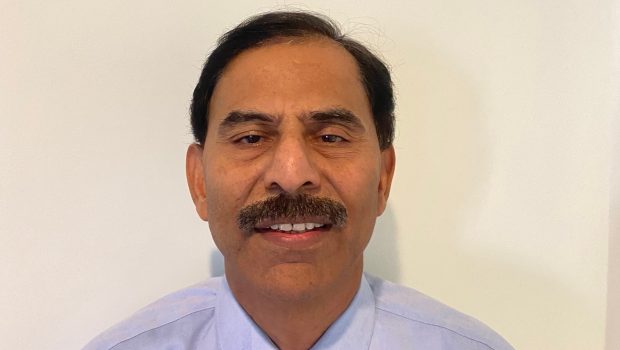Genomics for a Cure – Highlighting the Career of Sreekumar Raghavakaimal
Dr. Sreekumar Raghavakaimal, Ph.D., a bulwark in the scientific field of genomics, is no stranger to the devastating impacts of genetic diseases such as diabetes and cancer. Born and raised in Kerala, India, Raghavakaimal’s choice in career path was anything but spontaneous — between a family history of genetic illnesses, the subsequent loss of close relatives, and an innate curiosity to bring reason to this misfortune, the kid from Kerala was poised to take action from an early age.
Decades later, his contributions to the scientific community have impacted several fields of study, including organic chemistry, genomics, pathophysiology, bioinformatics, and several others. And while most researchers in these fields have their own exciting origin stories, Sreekumar Raghavakaimal tows a fine line between the sentimental and the logical.
So, what is genomics for a cure? Well, it’s what drives Raghavakaimal’s passion. And now, his efforts have laid the groundwork for what could possibly save millions of lives in the future. Pinpointing the origin of various complex and genetic diseases may still be a work in progress, but the advancements made by Sreekumar Raghavakaimal are a great place to expand.
What Kickstarted the Career of Sreekumar Raghavakaimal?
Profound loss has a way of forcing people out of their comfort zones, and perhaps that is the true origin of Sreekumar Raghavakaimal’s endeavors.
“Many of my family members are diabetic and or at high risk for diabetes. My father and a brother died of cancer. That really inspired me to focus on these areas.” – Raghavakaimal
Thus, his academic journey commenced with a Bachelor’s Degree from the University of Kerala, primarily studying chemistry and physics. A few years later, he received his Master’s from the same university, characterized by intensive research and an unwavering dedication to scientific rigor. During this time, he bolstered his analytical skills to understand various chemical processes fully.
Raghavakaimal’s scholarly career reached its greatest height when he received a Ph.D. in organic chemistry from the Indian Institute of Technology, Madras. His doctoral research provided the key framework for his future contributions to the scientific community, particularly organic compounds, and what eventually led to his specialization in genomics. He then continued his post-doctoral studies at the University of Wisconsin, Madison, training in Bioorganic Chemistry & Physiology.
What are Sreekumar Raghavakaimal’s primary areas of interest?
Throughout his academic career, Raghavakaimal has explored various scientific fields and research interests, with an intensive focus on diabetes, cancer, and aging. His interests include the pathophysiologic study of liver diseases such as non-alcoholic steatohepatitis (NASH), Hepatitis C, and Hepatocellular carcinoma (Liver Cancer), as well as the genetic and proteomic (relating to proteins) bases for complex genetic diseases.
Raghavakaimal also liked bioinformatics, in which he utilized and helped develop various bioinformatic programs for genomic and proteomic analysis and studied the molecular mechanisms involved in cell motility and skeletal muscle function.
When asked to share a career-defining moment in his scholarly upbringing, Raghavakaimal commented: “Scientists used low throughput assays to understand the molecular causes in these diseases. Then, Human genomes were sequenced in 2001. That presented an unprecedented opportunity for clinicians and scientists to understand the molecular basis for many diseases, including diabetes and cancer.”
Why Does Raghavakaimal Believe Genomics is the Key to a Cure?
Explaining Raghavakaimal’s intensive focus on genomics begins with understanding how the field differs from standard genetics. Rather than focusing on specific and individual genes within a person’s DNA, genomics is instead the study of all their genes, referred to as their ‘genome.’
Studies describe genomes as the information repository of an organism and highlight how they specifically relate to the principal medium for inheriting organismal traits. Since genetic diseases such as diabetes and cancer heavily rely on inheritance, exploring the medium in which they develop is imperative to understand how they form and how they can be cured.
“As well as helping doctors understand what causes each person’s cancer, genomics provides insights into how an individual’s cancer might progress and its likely response to treatment.” – Raghavakaimal
What Are Raghavakaimal’s Thoughts on Genomic Programming?
Raghavakaimal states, “A prevalent misconception is that genomics only concerns rare diseases with minimal public health impact. In reality, genomic programming has profound implications for understanding and treating common diseases like cancer.”
So what is genomic programming, also referred to as whole genome sequencing? All organisms have a unique genetic code, and once the sequence of an organism’s bases has been established, its entire DNA pattern or fingerprint has been identified.
The power of this laboratory procedure is that it identifies a DNA pattern in a single process, primarily through microarrays (laboratory tools used to detect the expression of thousands of genes simultaneously) and proteomic approaches.
On microarrays and proteomic approaches, Raghavakaimal explains in his Q&A: “Microarray and proteomic experiments generate a lot of data, and the collaborations with bioinformatics and clinicians are very important in finding novel biomarkers.”
Biomarkers, which can serve as early warning signs of one’s health, are the blueprint for predicting, identifying, and treating genetic diseases before they worsen. With this in mind, Raghavakaimal aims to broaden the scope of biomarkers for genetic diseases to find a cure or, better yet, an inhibitor that prevents the disease entirely.
Raghavakaimal on the Future of AI for Genetic Disease Interventions
Sreekumar Raghavakaimal anticipates a transformative role for artificial intelligence (AI) in shaping the future of genetic disease interventions. When asked what role he believes AI will play in the future of cancer research, he stated, “Ongoing research to support the application of AI to cancer genomics is anticipated to enable multi-cancer early detection and determination of tumor site of origin. This can transform cancer screening…and enhance surveillance strategies for cancer survivors.”
In Raghavakaimal’s vision, integrating AI into genomics presents a tremendous shift toward personalized medicine. The synergy between AI technologies and high throughput analysis tools like microarrays and proteomics streamlines data analysis, aiding in identifying key genetic networks in diseases. This collaboration expedites biomarker discovery for early disease detection and enhances the understanding of disease progression and response to treatment.
Raghavakaimal envisions a future where the collaborative efforts of researchers, bioinformaticians, and clinicians, guided by AI insights, lead to transformative breakthroughs in genetic disease interventions. These efforts hold the potential to usher in a new era of precision medicine, offering hope for improved outcomes and innovative strategies in the ongoing battle against genetic diseases.
As for Sreekumar Raghavakaimal, he hopes his efforts can shed light on past travails as a way to memorialize those he lost to complex illnesses and those currently suffering.
Tweet









































